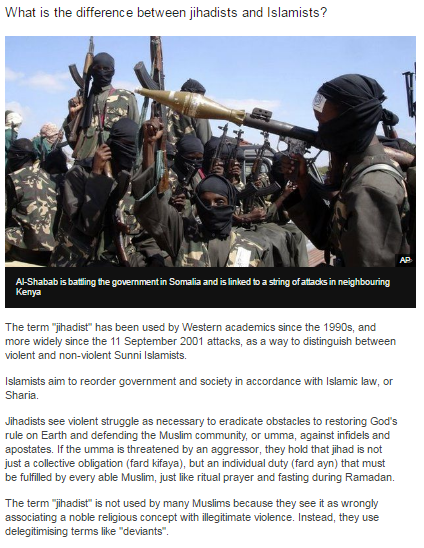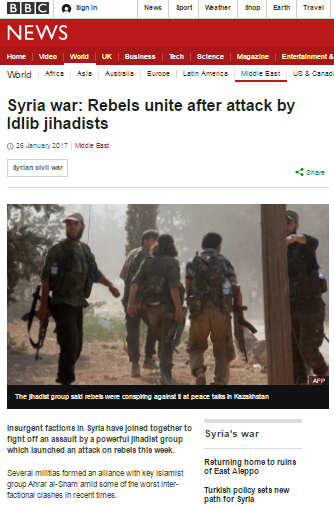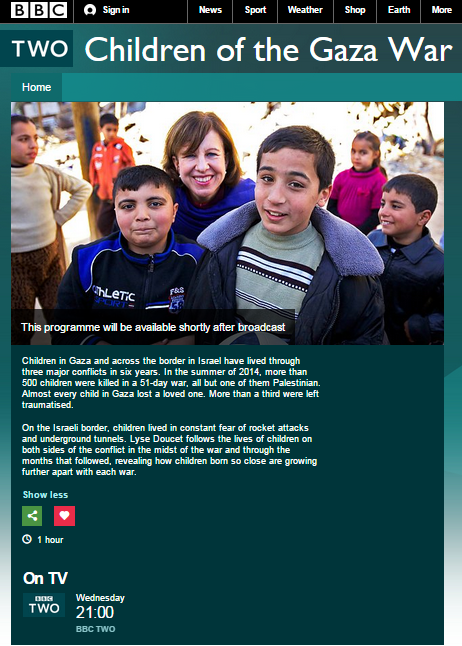Back in December 2014 the BBC News website published a backgrounder titled “What is jihadism?” which included the following section:

In other words, audiences can apparently conclude that when the BBC uses the term ‘jihadist’ it is telling them that the group described as such uses violence and that when the term ‘Islamist’ is employed, they can understand that those described in that way are non-violent.
With that in mind, it is interesting to see how an article published on January 26th under the headline “Syria war: Rebels unite after attack by Idlib jihadists” describes differing factions in Syria. [all emphasis added]
“Insurgent factions in Syria have joined together to fight off an assault by a powerful jihadist group which launched an attack on rebels this week.
Several militias formed an alliance with key Islamist group Ahrar al-Sham amid some of the worst inter-factional clashes in recent times.
Jabhat Fateh al-Sham has accused the rebels of conspiring against it at peace talks in Kazakhstan this week. […]
JFS has been involved in clashes with rebels in Idlib and neighbouring west Aleppo since Tuesday.
Ahrar al-Sham, which has rejected calls by outside powers to dissociate itself from JFS, blamed the jihadists for starting the fighting. […]
On Thursday, Ahrar al-Sham said JFS had rejected its attempts to mediate. The Islamists warned JFS that any attack on its members would be considered a “declaration of war”, according to Reuters news agency.”
The Reuters article also provides more detail:
“Rebel factions Alwiyat Suqour al-Sham, Fastaqim, Jaish al-Islam’s Idlib branch, Jaish al-Mujahideen and al-Jabha al-Shamiya’s west Aleppo branch said in a statement they had joined Ahrar al-Sham.
The Ahrar al-Sham statement also mentioned a sixth group, the Sham Revolutionary Brigades, and said “other brigades” had joined.”
In other words, based on the information previously provided in the BBC’s backgrounder, audiences are encouraged to believe that while Jabhat Fateh al-Sham (formerly Jabhat al Nusra) is a jihadist group that uses violence, Ahrar al-Sham is an ‘Islamist’ group which – by the BBC’s definition – does not. That is clearly not the case at all and obviously the terminology used by the BBC in this report is not sufficiently accurate.
Meanwhile, since that January 26th BBC report was published, Reuters and other outlets have reported the formation of another ‘coalition’ in Syria.
“An online statement issued by the Islamist factions announced the formation of the Hayat Tahrir al-Sham (Liberation of the Levant Committee).
It said the alliance was formed to mend splits among insurgent groups and strengthen opposition to the Damascus government.
The signatories were Jabhat Fateh al-Sham, formerly al Qaeda’s Nusra Front, the Nour al-Din al-Zinki group, Liwa al-Haqq, Jaish al-Sunna and Jabhat Ansar al-Din.”
The FDD reports that the leader of that new coalition – which the BBC would presumably have described as ‘jihadist’ had it reported on the topic – was previously the head of the group it portrays as ‘Islamist’.
“In a statement released online, the joint venture partners say they have merged to form Hay’at Tahrir al Sham, or the “Assembly for Liberation of the Levant.” It is led by a jihadi known as Abu Jaber (also known as Hashem al Sheikh), the former head of Ahrar al Sham, which continues to operate under its own name in Syria. […]
Some reports have identified Abu Jaber as a former member of al Qaeda in Iraq. […]
The establishment of Tahrir al Sham comes after weeks of reported clashes and fierce disagreements between different jihadi factions and other insurgents in northern Syria. It is difficult to discern how the situation unfolded, but JFS and Ahrar al Sham have reportedly disagreed over the direction of the insurgency, leading to some clashes. The two groups have long fought side-by-side against the Assad regime and others. Indeed, Ahrar al Sham has its own links to al Qaeda and openly models itself after the Taliban.”
Clearly audience understanding of this complex topic is not enhanced by the BBC’s use of inaccurate and confusing labels.
Related Articles:
Is the BBC’s report of Jabhat al-Nusra ‘split’ from al Qaeda too simplistic?




